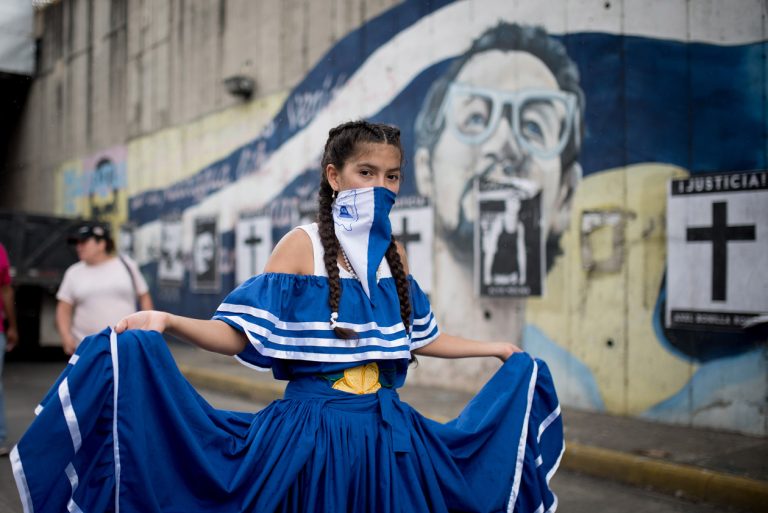14 de julio 2018

European Concern over Lack of Academic Freedom in Nicaragua

PUBLICIDAD 1M
PUBLICIDAD 4D
PUBLICIDAD 5D
This is how the capitol marked the first of three intense days of civic struggle called for by the Civic Alliance for Justice and Democracy.

The new government must also take into account it is very difficult to govern a divided Nicaragua. A country with enemy sides
On day #87 since the protests began in Nicaragua, thousands of Nicaraguans went out onto the streets of Managua and several departments in the country, to demonstrate once again their repudiation of Daniel Ortega’s government. The Managua demonstrators marched from the “Cristo Rey” roundabout to the “Jean Paul Genie” traffic circle, yelling “They must go!” and “They were students, not criminals”, slogans that have been present since the demonstrations began in April of this year.
Despite an intensification of government repression in the last week – the attack on the bishops from the Episcopal Conference and the deaths from the last large march held June 30th in Managua (the “March of Flowers”) – the citizens went back out onto the streets accompanied by their protest signs, noisemakers and Nicaraguan flags.
This is how the capital marked the first of three days of intense civic struggle called for by the Civic Alliance for Justice and Democracy. Thursday’s march was followed by a general strike on Friday, July 13, and later a “blue and white” caravan on Saturday. All these actions are “measures to pressure President Daniel Ortega, demand his resignation and early elections,” stated student leaders and members of civil society.
A demonstrator holds up a sign with the faces of Alvaro Conrado (right) and Neomar Lander (left). Conrado was the fifteen-year-old shot while taking supplies to protesters inside Managua’s Metropolitan Cathedral; Lander, 17, is a young Venezuelan who died in the May 2017 protests in Caracas, Venezuela. Both are considered “martyrs”. Photo: Carlos Herrera
This is the first mass activity since the “March of the Flowers” that was also convoked by the Civic Alliance, business leaders and the student movements. In contrast to the former which left one dead and several injured, the July 12 march was calm with no major incidents. Photo: Carlos Herrera
The latest statistics released by the Inter-American Commission for Human Rights (IACHR) in a report presented July 11 to the OAS, counted 264 dead and more than 1,800 Nicaraguans injured. Despite these harsh facts released by the IACHR, thousands went out with their signs to demand justice. Among them were seniors and children. Photo: Carlos Herrera
Justice is one of the demonstrators’ principal demands. Recent reports from the IACHR on the Nicaraguan crisis indicate that the family members of the victims have no faith in the country’s judicial system. Photo: Carlos Herrera
[“Did you forget, Mr. Ortega, that the State is there to protect the people not to kill them? It’s not right to suffer just for thinking differently from you.”] “Demonstrators hold signs with messages opposing the presidential family and their policies. The march was also punctuated with slogans, among the most common: “They must go!”, “They were students, not criminals!”, “What’s our road [to democracy]?” and many others characterized by satire and humor. Photo: Carlos Herrera
[“There aren’t bullets enough to kill our dreams!”] The signs held by the demonstrators at each march are creative, forceful and direct. Photo: Carlos Herrera
[“The rights of children”] According to a report from the Nicaraguan Association for Human Rights, from April 18 through June 25, twenty-one minors were reported killed due to the repression in Nicaragua. The IACHR has also reported that up through June 2, sixty-four teens between 14 and 17 years old were being held in Nicaraguan jails. Photo: Carlos Herrera
Archivado como:
PUBLICIDAD 3M
Confidencial es un diario digital nicaragüense, de formato multimedia, fundado por Carlos F. Chamorro en junio de 1996. Inició como un semanario impreso y hoy es un medio de referencia regional con información, análisis, entrevistas, perfiles, reportajes e investigaciones sobre Nicaragua, informando desde el exilio por la persecución política de la dictadura de Daniel Ortega y Rosario Murillo.
PUBLICIDAD 3D